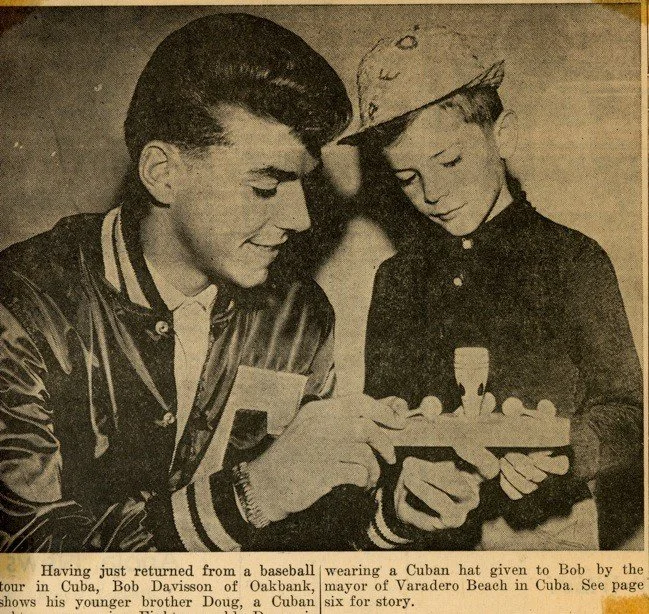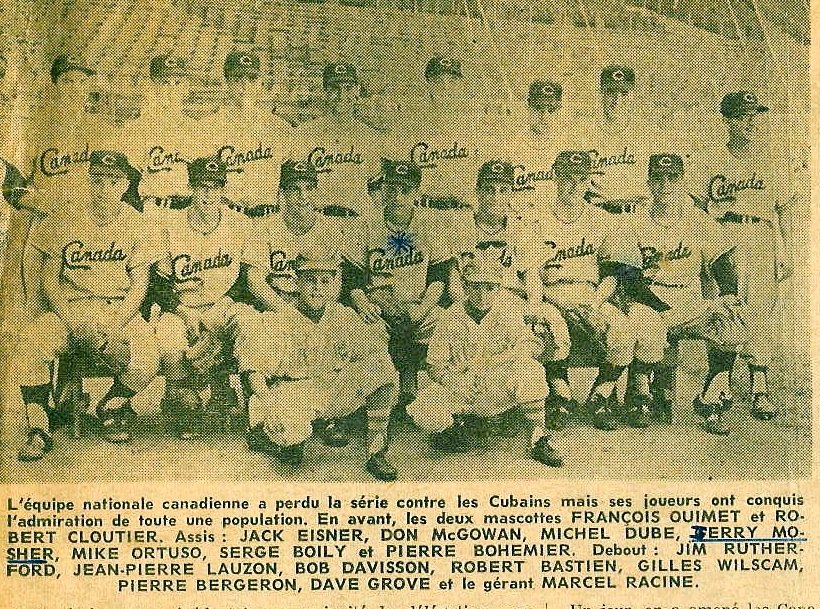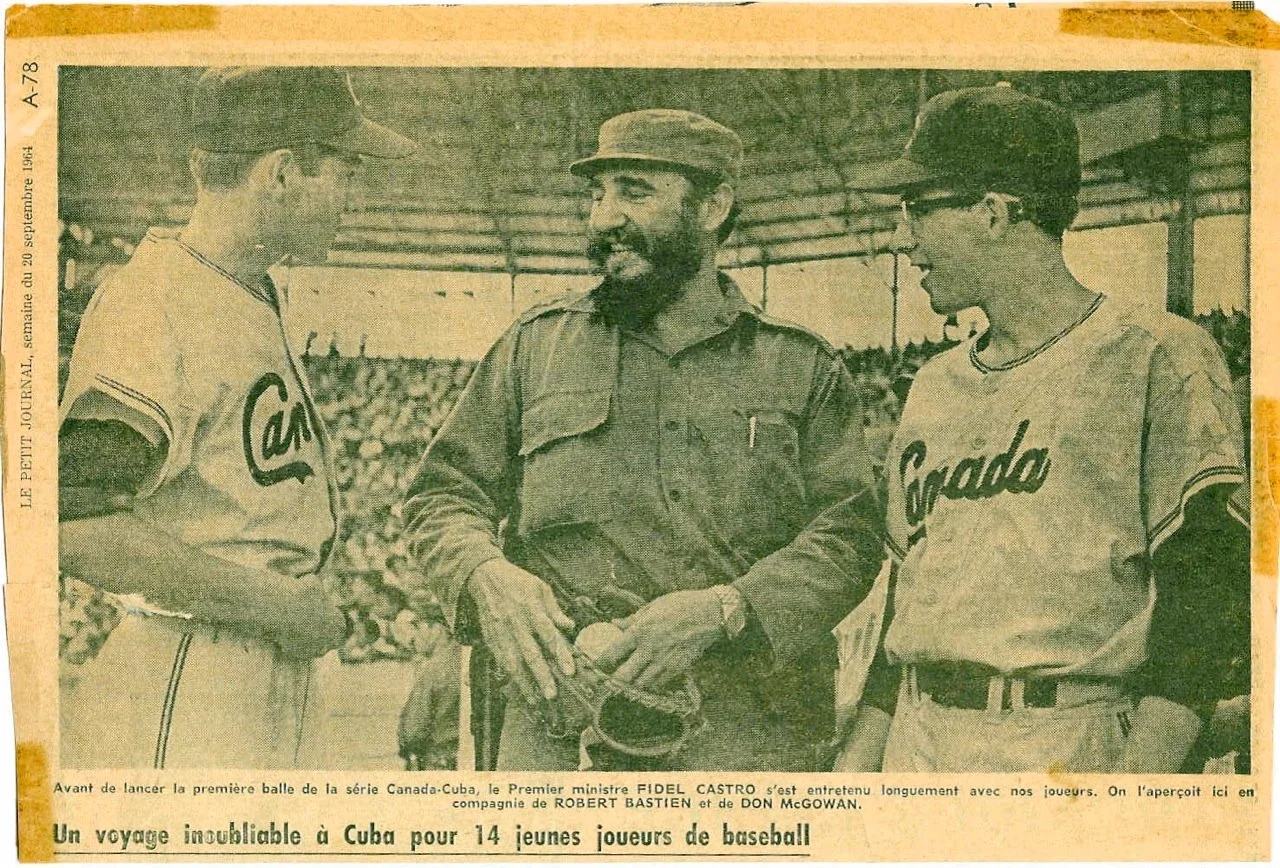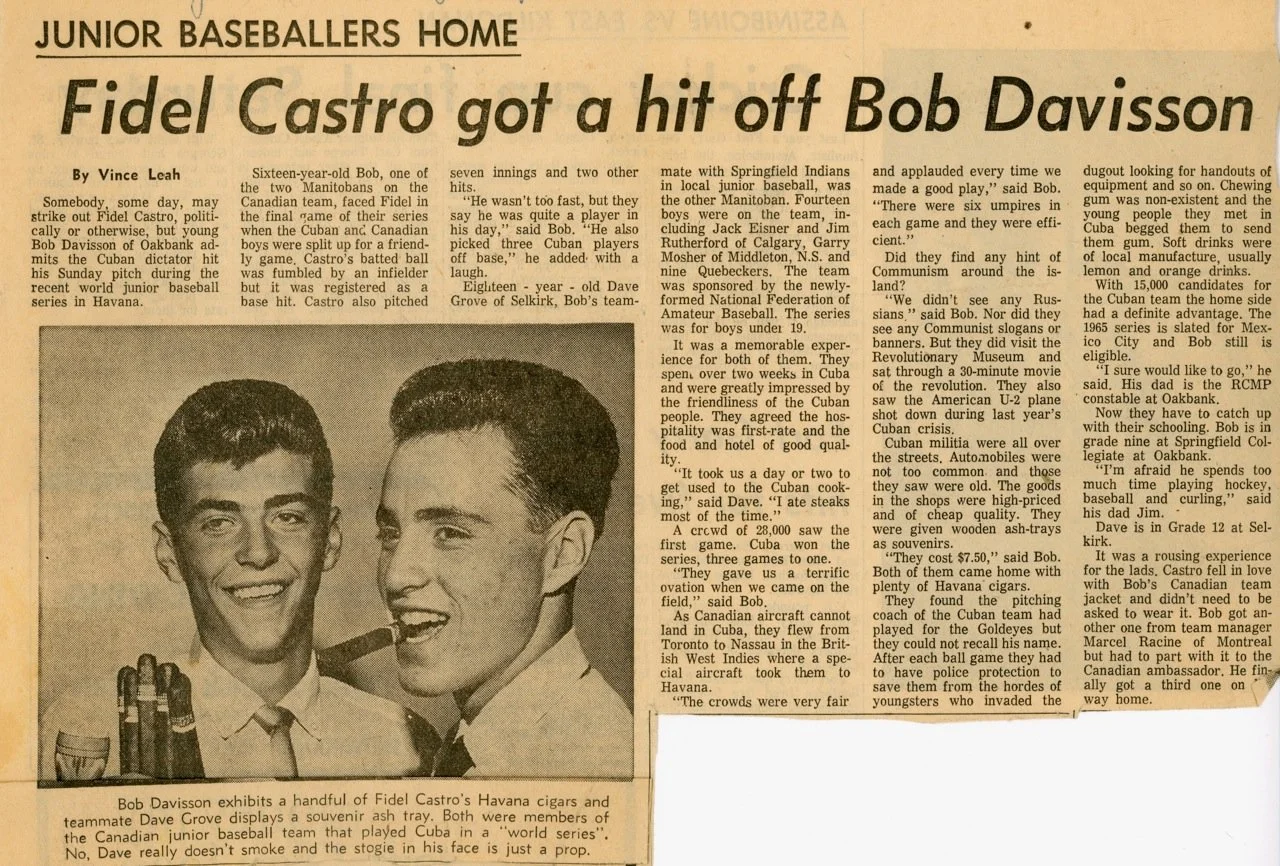Davisson recalls being a part of Canada’s first junior national squad
July 1, 2022
By Kevin Glew
Canadian Baseball Network
It could be called Canada’s first junior national team, and Bob Davisson, then a naïve, 16-year-old left-hander from Oakbank, Man., was part of it.
He recently contacted Baseball Canada to reminisce about that trailblazing squad of 14 teenagers, selected from four provinces, that travelled to Cuba in September 1964 to compete in the World Junior Amateur Baseball Championships.
The team was put together by Quebec coaching legend Marcel Racine shortly after the Canadian Federation of Amateur Baseball, a forerunner of Baseball Canada, was established that same year.
Davisson and fellow Manitoban pitcher Dave Grove had been recommended to Racine by Manitoba’s director of amateur baseball and famed broadcaster, Bob Picken.
A southpaw pitcher/first baseman, Davisson was competing for the Springfield Indians, a Manitoba Junior Baseball League team founded by his stepfather, Jim, when he received the invitation to the tryout camp in Montreal.
“Going to Montreal was a huge adventure to me,” said Davisson. “The coach also gave me a new glove. I just had a battered up old glove. We didn’t have much money . . . so that was pretty neat.”
At 16, Davisson was the youngest player at the camp. Born in Edmonton and raised by a single mom and two uncles on a farm with no electricity in Rutland, Sask., Davisson had survived some serious health issues.
“I was a breech birth so both of my lungs were full. I was really, really sick and they actually brought my mom in on three different occasions to hold me for the last time,” said Davisson. “They said I wouldn’t live through the night.”
But against the odds, he did live and seven years later, he played for his first organized baseball team.
“I threw a lot of rocks. I loved throwing,” said Davisson. “Apparently I was about eight before I started to focus on throwing with my left hand.”
His stepfather was in the RCMP and the family moved around and it wasn’t until they settled in Oakbank, Man., that Davisson began to get more serious about baseball. By that time, he was 15 and starring for the aforementioned Springfield squad.
“I had a lot of accuracy, but at that time I didn’t have a lot of speed because I was only 160 to 165 pounds,” said Davisson.
He was impressive enough, however, for Picken to recommend him to Racine, who invited him to the national team tryout camp in Montreal in August 1964.
During the camp, the team played exhibition games against a Cuban squad. Davisson fared well enough to make the team, which consisted of nine players from Quebec, two each from Manitoba and Alberta and one from Nova Scotia.
Hockey Hall of Famer Yvan Cournoyer was a standout infielder at the camp, but he couldn’t travel with the team to Cuba due to his commitment to the Montreal Canadiens. But Michel Bergeron (identified as Pierre Bergeron in the team photos) did crack the roster and make the trek to Cuba. The future Quebec Nordiques coach was a catcher on the team.
Canada’s “first” junior national team in September 1964. Photo: Bob Davisson collection
As the Canadian juniors prepared to travel to Cuba for what was being called the World Junior Amateur Baseball Championships, they expected to compete against 12 countries. But due to the volatile relationship between the U.S. and Cuba in wake of the Cuban Missile Crisis, the American squad withdrew and other countries followed.
“We flew to Nassau and then on a Russian airliner to Cuba,” said Davisson. “On the way, we got word that [Cuban Prime Minister Fidel] Castro would only allow Canada to fly into Cuba. Other countries may have backed out because the U.S. still had the island surrounded . . . The U.S. ships were 20 miles out and you could pretty much read with your naked eye the numbers on the battleships.”
Davisson says the Canadian team was treated warmly in Cuba. The tournament was converted into a best three-out-of-five series between the Cubans and Canadians.
“Fidel Castro was at the opening ceremony,” said Davisson. “I remember there was a lot of military at the opening ceremony. You could see them up in the stadium with their rifles. The security was incredible and Fidel threw out the first pitch.”
But Davisson says this was a different Cuban team than the one they had played in exhibition games in Montreal.
“There was only one player left from the team they brought to Canada,” said Davisson. “The rest of the players were obviously in the 20s. It was not their junior team. These guys were much older and more muscular.”
Canada was trounced 11-2 in the first game and Davisson allowed two runs in the inning he pitched in relief.
“The thing that stands out to me was that I was pitching and I had a 3-2 count on a guy and that whole stadium [with more than 20,000 fans in it] started clapping in sequence. Just bang, bang, bang,” recalled Davisson of the passionate Cuban fans.
The Canadians lost the second game before rallying for a 9-8, 10-inning win in the third and then dropping the fourth to lose the series.
Davisson’s most vivid memories, however, are of playing in an exhibition game in which the teams were mixed so that some of the Canadians and Cubans played together, and Castro was on the opposing team.
“I was pitching and the Cuban coach came out and told me I had to let Castro get a hit. He said I had to throw no curves and no fastball. ‘Just throw straight and let him hit,’” recalled Davisson. “So I did. And he hit a ball that went to my third baseman who was a Cuban and he drops it on purpose, so Fidel could get on base.”
A clipping from Bob Davisson’s home town paper about Fidel Castro batting against him.
After the game, Racine, the Canadian coach, offered to give Castro a glove, but the Cuban leader wouldn’t accept it.
“So the coach turned and looked back at me because I was one of the bigger guys and on the team and he said, ‘Give me your jacket.’ So I gave him my baseball jacket and he gave it to Fidel,” said Davisson.
Though he doesn’t have his jacket from the event, Davisson still has the medal the Canadian team was given for participating.
Bob Davisson’s 1964 national team medal from the Cuban series.
The young lefty continued to pitch after his national team experience.
“I was invited to a St. Louis Cardinals amateur training camp in Winnipeg when I was 17,” recalled Davisson. “I had control, but I didn’t have a lot of speed at the time. I had a good curveball and a good changeup and my fastball was well placed, but they were looking for pitchers that would throw fast.”
Davisson eventually followed his stepfather into the RCMP, but he continued to toe the rubber for semi-pro teams in Vernon and Kamloops, B.C. when he was stationed in those cities.
“I put on a lot of speed because after I joined the RCMP, I put on about 30 pounds in training and my fastball changed . . . It was humming really good,” he said
Davisson was also advancing in his career with the RCMP.
“I specialized with the police dogs for about four years before I ruptured four discs in my back, but I was then transferred to the training academy where I was a shooting instructor,” he said.
He excelled as a shooter and he was the police combat national shooting champion nine times.
“Then I got into Olympic shooting and became the national free pistol champion,” shared Davisson.
He won bronze at a pre-Olympic competition in Mexico City in 1984, but his lung issues resurfaced.
“When I was in Mexico, I picked up an infection and it just got worse and worse,” he said. “So I couldn’t compete and I couldn’t train [for the Olympics] . . . I ended up having a tumor at the bottom of my left lung.”
Suffering with breathing issues and excruciating migraine headaches, Davisson, who by this time also owned a McDonald’s restaurant, grew despondent and at one point, contemplated ending his life.
Fortunately for him, he was invited to a dinner with a Christian group where he experienced a spiritual awakening. He has had a deep and abiding faith ever since. He says he prayed about his lung tumor and it disappeared.
Strengthened by his faith, Davisson left the RCMP and never participated in another shooting competition. Instead he decided to focus his energy on creating a charity with his wife, Linda, called Lifeline Haiti. It’s an organization that has built schools and provides access to education for impoverished children in the country. In the 19 years since the charity began, he has helped set up more than 50 schools and has become an in-demand Christian speaker around the world.
These days, however, you are more likely to find the 74-year-old roasting coffee beans at his home in Medicine Hat. He owns the Creekside Coffee Roasting Co. and sells his product to high-end coffee shops with proceeds going to his charity.
“It really gives my mind a break. When you roast, you focus. It’s an art. You’ve got to focus like crazy. It’s a good mental thing,” he said.
But while he’s roasting, his mind sometimes wonders back to that junior national team he was part of in 1964. He wonders how many of his former teammates are still alive?
He’d love to reconnect with them.
He’d also love to get his hands on an old photo album that he recalls had large pictures from that tournament in Cuba. The album was sent around to the players after the tourney and they were allowed to keep it for a week before returning it.
“I wish I could find that photo album somewhere,” said Davisson. “It had photos of the opening ceremonies and all that stuff in it. It was incredible.”
***
If you were a member of the 1964 Canadian junior national team or a relative of a player on that squad, please contact me at kevin.glew@sympatico.ca and I will connect you with Bob. If you have a lead on the photo album, please contact me as well.
**All photos provided by Bob Davisson.





